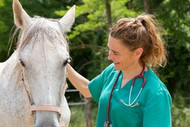Essential Equine Vaccinations
May 7th 2020
 Horses are more than pets or a mode of transportation. On farms, these animals serve a functional purpose, helping riders wrangle livestock and traverse landscapes unsuitable for vehicles. Some are show animals ridden in competition. Some lucky owners simply enjoy the feeling of freedom that comes with riding for purely recreational purposes.
Horses are more than pets or a mode of transportation. On farms, these animals serve a functional purpose, helping riders wrangle livestock and traverse landscapes unsuitable for vehicles. Some are show animals ridden in competition. Some lucky owners simply enjoy the feeling of freedom that comes with riding for purely recreational purposes.
In all of these cases, however, it is the responsibility of the owner to see that their horses are properly cared for and kept in good health. This means subscribing to a regimen of vaccinations essential to maintaining equine health. Here are several vaccines you should be providing your beloved horses to prevent disease and protect your animals.
Encephalomyelitis (VEE, EEE, WEE)
Equine encephalomyelitis, also known as sleeping sickness, is a virus that affects the brain of the horse. Of the three known strains of this infectious disease (Eastern, Western, and Venezuelan), Eastern is the most common. Unfortunately, it also has the highest mortality rate. Controlling mosquito populations can help to stop the spread of this disease, but the main deterrent is regular vaccination.
Foals can be immunized at 3-4 months of age, receiving a second dose at 4-5 months. Further vaccinations should be administered annually in the spring to all horses, ideally before mosquito season. Broodmares can receive vaccination 4-6 weeks before foaling.
Influenza
You get your flu vaccine every year, so why wouldn't you extend your horses the same courtesy? Equine influenza is an extremely common virus that can quickly spread among horses, causing respiratory distress. Young horses (age 1-5) are especially susceptible, which is why foals should receive their first vaccine at 3-6 months of age, with additional immunizations at 4-7 months and 5-8 months, repeating at 3-month intervals.
Yearlings and performance horses need boosters every 3-6 months, while biannually will suffice for pleasure horses. Broodmares should receive a booster at 4-6 week prefoaling.
Rabies
Rabies isn't terribly common among horses, but when the virus is transferred through a bite by an infected animal, the disease is fatal. For this reason, owners are recommended to have foals vaccinated at 3-4 months of age, with recurring immunization annually.
Rhinopneumonitis (EHV-1 and EHV-4)
Equine rhinopneumonitis (equine herpesvirus) spreads through respiratory contact, and while some horses are merely carriers, others can develop symptoms like neurological disease and reproductive issues. Foals are at high risk and should receive vaccinations at 3-4 months, 4-5 months, and 5-6 months of age, followed by repeat immunization every 3-6 months. Performance horses can receive vaccination every 3-6 months, while pleasure horses should be vaccinated biannually. Broodmares should receive inactivated EHV-1 vaccine at the 5th, 7th, and 9th month of gestation.
Strangles
Strangles (streptococcus equi), also called distemper, is a highly contagious bacterial infection that most often affects weanlings and yearlings. It can be spread through direct contact between animals or indirect contact with infected materials. This disease is rarely fatal, but it can result in fever, respiratory distress, painful abscesses on the head and throat, and more.
Foals should be vaccinated at 8-12 weeks, 11-15 weeks, 14-18 weeks, and 6-8 months, although the exact schedule may depend on the product used. Afterwards, horses should be vaccinated biannually, especially in cases of high risk. Broodmares can be immunized at 4-6 weeks prefoaling.
Tetanus Toxoid
As with humans, tetanus is rare, but once contracted, is often fatal. It is not contagious, but is transmitted through open wounds exposed to Clostridium tetani bacteria. Foals should be vaccinated at 3-4 months and 4-5 months of age. Afterwards, horses should be immunized annually, with broodmares receiving vaccination at 4-6 weeks prefoaling.

